Time management refers to planning, organizing, and controlling how you allocate your time to different tasks and activities.
It involves identifying your priorities, setting goals, and using various strategies and techniques to use your time effectively.
The primary objective of time management is to optimize productivity and efficiency. By managing your time effectively, you can ensure you accomplish important tasks, meet deadlines, and avoid procrastination.
The benefits of time management
Let’s run through some of the key benefits of effective time management:
1. Increased productivity
One of the most significant benefits of effective time management is increased productivity.
When we prioritize and allocate our time efficiently, we can better complete tasks on time, meet deadlines, and achieve goals.
Effective time management using time tracking data helped software developers, 3angleTech, reduce time-wasting activities, increasing productivity and decreasing micromanagement
2. Less stress
Effective time management can also help to reduce employees’ stress levels by preventing overwork, last-minute rushing, and burnout.
It helps them maintain a healthy work-life balance by allowing them to relax without compromising on work responsibilities.
Moreover, they have enough time not only to complete their tasks, but also to identify the areas in which they need to improve their skills or knowledge to advance professionally.
3. Blooming creativity
Effective time management can greatly impact the ability to be creative.
By prioritizing tasks and allocating a specific amount of time to each task, you can eliminate distractions and focus exclusively on the task at hand.
This increased focus allows for deeper thinking and problem-solving, which can lead to innovative ideas and solutions.
4. Lower absenteeism
Effective team time management ensures can complete their tasks and achieve their goals efficiently, resulting in lower absenteeism.
When employees cannot manage their time correctly, they tend to take more sick leave or fail to meet deadlines, ultimately impacting their performance and productivity.
This can lead to burnout, stress, dissatisfaction with work-life balance, and ultimately high absenteeism or even quitting altogether.
5. Better reputation
Companies that prioritize and apply effective time management techniques are more likely to meet deadlines, deliver quality products or services, and keep their customers happy.
Manging our time effectively brought transparency and trust into the relationship with our clients.
Dominika Babulicová, Marketing manager at Lighting Beetle*
Key time-management skills to master
Time management encompasses everything from planning your projects and prioritizing your workflow to achieving your goals.
Here’s a breakdown:
Organization
Take a moment to think about the way you currently do things.
Ask yourself:
- Are you organized enough?
- Are you using tools that help you work smarter?
If the answer is “no”, consider work on organizing your tasks, projects, appointments, and deadlines more efficiently. Consider creating project timelines or utilizing kanban boards to better organize your tasks and projects.
You can easily build project timelines using a tool like Toggl Plan:
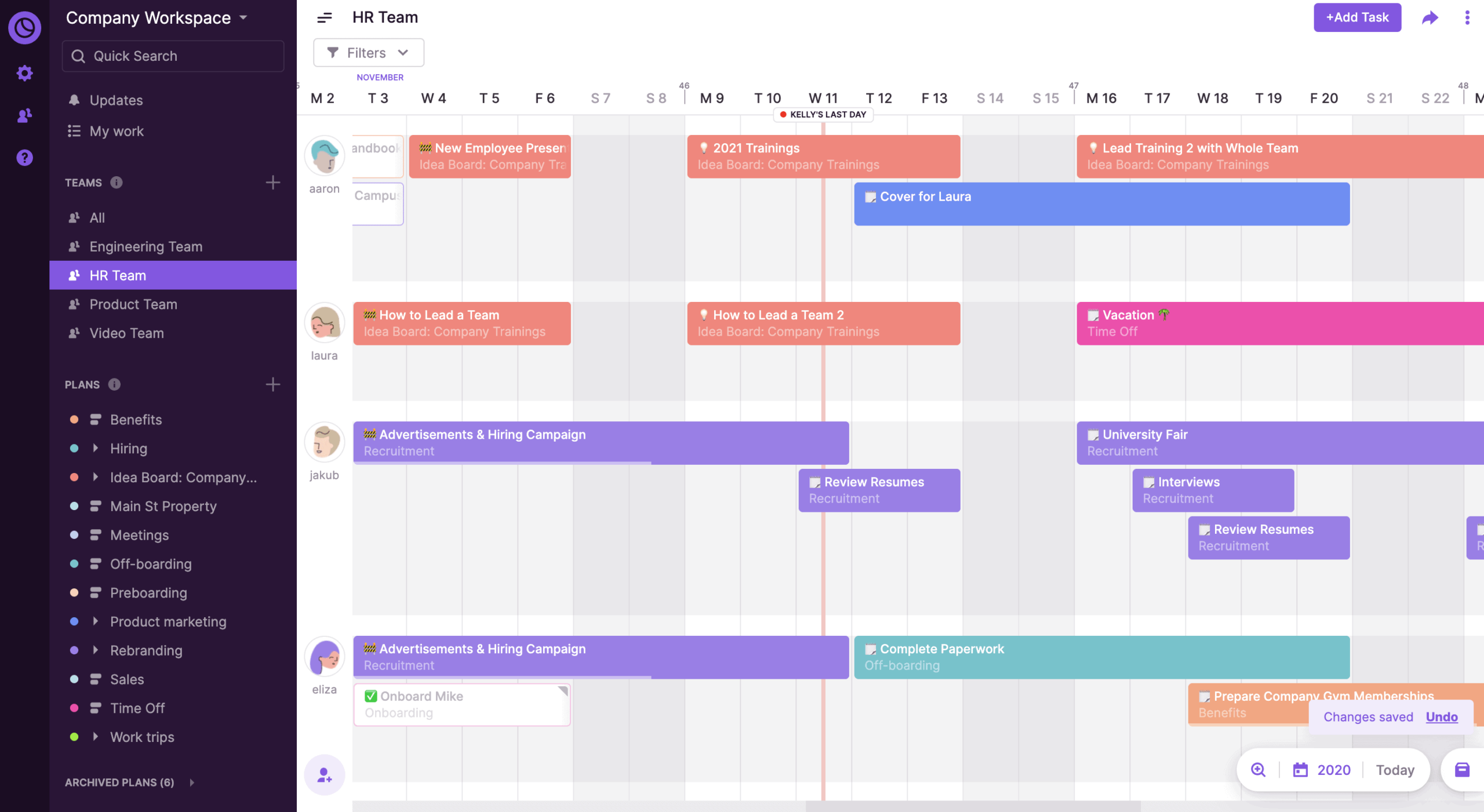
This way, you can better manage your time by vizualing yout work—avoiding being overwhelmed by a multitude of tasks.
Prioritization
Another important skill is prioritization, that is, identifying the most important tasks that require immediate attention.
Prioritizing allows you to focus on getting urgent matters done without sacrificing quality or missing deadlines.
This skill is incredibly important when it comes to focusing on the essentials and can help you in your life, both professionally and personally.
Goal-setting
Goal-setting is also critical to effective time management because it helps give direction to your efforts.
Setting attainable project objectives and goals and breaking them down into smaller objectives will make them easier to accomplish and keep you motivated along the way.
Check your stated goals against the SMART framework: are they specific, measurable, achievable, realistic, and time-bound?
Planning
When you work according to a solid plan, you think ahead, prepare for all contingencies, and find alternate paths when needed.
That way, you’re less likely to be unprepared and better equipped to deal with potential problems.
Early planning also contributes significantly to good time management, as you can anticipate possible obstacles and allocate enough resources for each task.
Delegation
Sometimes our workload is so great that we cannot do it alone.
Delegation is an important skill that allows for the efficient use of resources by assigning certain tasks to other team members or outsourcing work when needed.
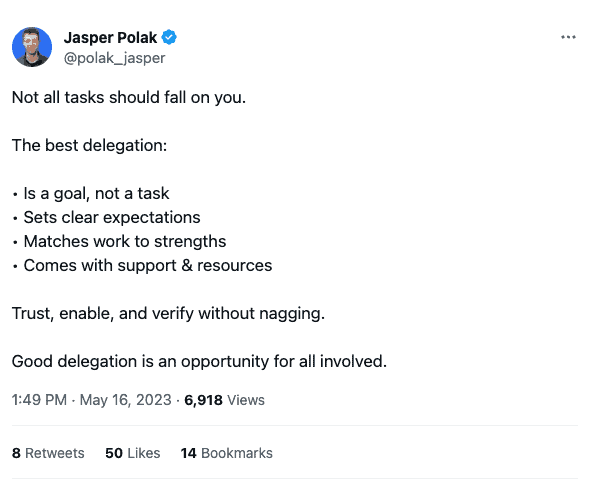
Time management tips to boost productivity
Here are some of our favorite time-management tips to help you manage your time and boost productivity.
Track your time
Tracking time spent on tasks for a week or two will give you an accurate picture of where your time goes and uncover those time-wasting areas.
Track your time with a tool like Toggl Track, and you can generate and analyze time reports to discover where you’re spending your time:

Prioritize your tasks
Prioritize your tasks by organizing your workload so that you are not overwhelmed or stressed by tackling the most important tasks first.
This will help you create a more structured routine and stay productive throughout the week.
You can use the Eisenhower Matrix to help you do this.
It will help you answer two questions:
- Which tasks are essential?
- Which tasks can be eliminated?
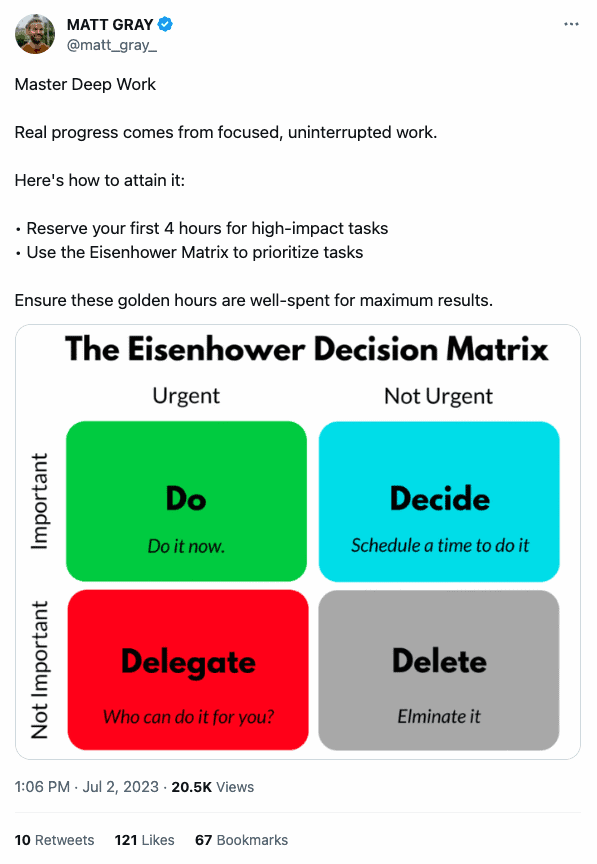
Leverage time blocking
Time blocking is a method of time management in which you divide your day into blocks of time.
Each block is dedicated to completing a specific task or group of tasks, and only those specific tasks.
Take stock of what’s coming up in the week ahead and create a rough outline of your time blocks for each day. It could look something like this:
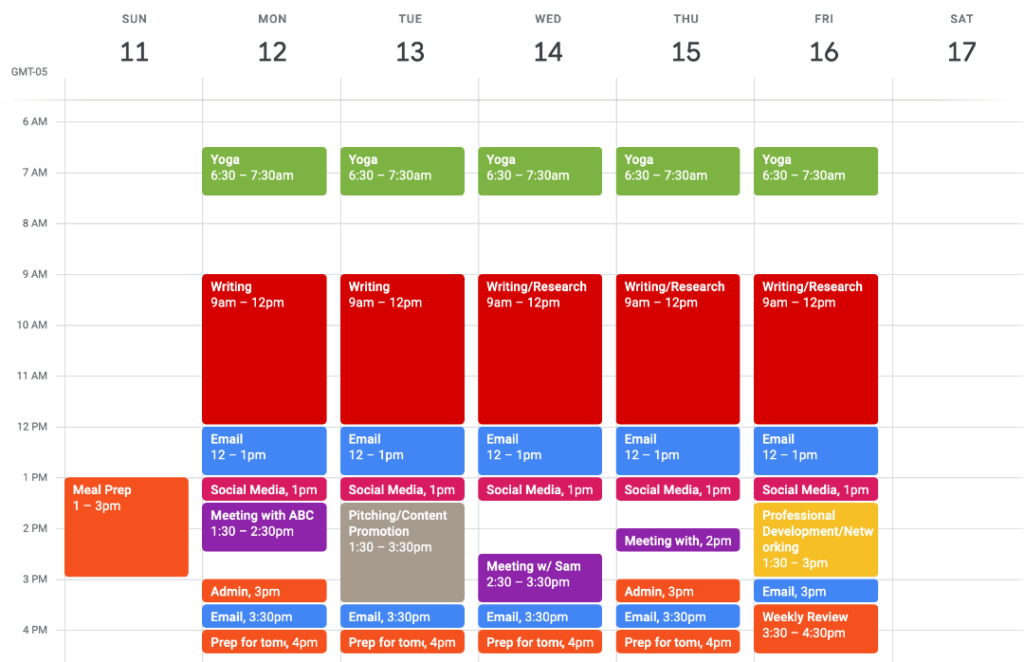
With this method, you don’t have to decide what to focus on constantly. You just have to stick to your schedule.
If you get distracted, look at your schedule and get back to the task you blocked out time for!
Remove distractions
Removing distractions from your work day can drastically improve your time management.
If you’re feeling overwhelmed by the number of distractions in your life, it’s time to take action:
- Identify the specific websites that are draining your time and energy.
- Consider setting boundaries – perhaps limiting your daily usage or blocking access altogether during certain hours.
Try a website blocker like Freedom to reclaim focus and productivity.

Avoid multitasking
Contrary to popular belief, multitasking doesn’t save time. It actually slows you down.
The effects of trying to do more than one task at a time can have negative consequences for both you and your team.
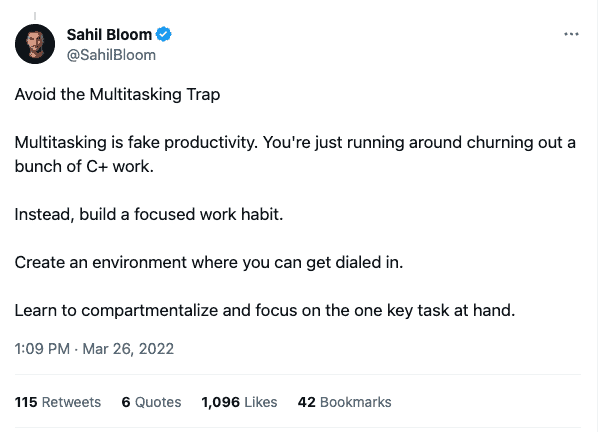
Take your time management to the next level
Check the following guides if you’re interested in learning more about time management:
- 9 Best Time Management Apps for Peak Productivity in 2024
- 15 Tested Ways to Improve Team Time Management
- 11 Time Management Tips to Work Less & Play More
- Time Management Tools for Every Use Case
Work tools to elevate your productivity – apps for incredibly simple time tracking and effective project planning.




